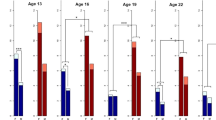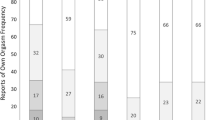Abstract
Gender confirming surgery (GCS) and cross-sex hormones (CSH) are crucial steps in the self-realization of a transsexual individual. However, no study has analyzed the outcome of GCS in a eudaimonic perspective, nor explored eudaimonic well-being before GCS. The study compares the eudaimonic well-being of trans men (N = 56) and women (N = 89) before and after GCS; in the MtF sample, a further comparison was carried out between those who never started any medical intervention and those who were already taking CSH. Finally, the impact of experiences of harassment, discrimination and violence on eudaimonic well-being in the post-surgery sample was explored. All participants completed the Psychological Well-being Scales (Ryff in J Pers Soc Psychol 57:1069–1081, 1989) and, only the post-surgery sample, a questionnaire to assess previous experiences of harassment, discrimination and violence. Both in MtF and FtM participants, those who already received GCS showed higher scores on self-acceptance; in the MtF sample, higher scores were also found on environmental mastery and lower scores on personal growth. The association between experiences of discrimination on well-being was limited and positive, with higher scores in personal growth only in FtM participants who reported being victims of such experiences. Our results suggest that both MtF and FtM transsexuals show higher levels of eudaimonic well-being after GCS.
Similar content being viewed by others
Notes
The term “transgender” is often used as an umbrella term to designate people whose gender identity and/or gender expression differs from what is typically associated with the sex they were assigned at birth. Within this category, transsexual people are those whose gender identity is the opposite of the assigned sex at birth, and therefore pursue hormonal and/or surgical treatments. Transsexual women are often referred to as Male-to-Female (MtF), while transsexual men as Female-to-Male (FtM). Although some authors and some trans people still adopt the term transgender even when explicitly referring to transsexual people, in Italy the term transsexual is still widely used and all the participants in the present study self-identified as such.
References
American Psychiatric Association. (2013). Diagnostic and statistical manual of mental disorders (5th ed.). Washington, DC: Author.
Bockting, W. O., Miner, M. H., Swinburne Romine, R. E., Hamilton, A., & Coleman, E. (2013). Stigma, mental health, and resilience in an online sample of the US transgender population. American Journal of Public Health, 103, 943–951. doi:10.2105/AJPH.2013.301241.
Browne, K., & Lim, J. (2008). Count me in too: LGBT lives in brighton and hove. Brighton, UK: University of Brighton. Retrieved from http://www.brighton.ac.uk/cupp/images/stories/projects/c-ke/LGBTU/CMIT_Safety_Report_Final_Feb08.pdf.
Caldarera, A., & Pfäfflin, F. (2011). Transsexualism and sex reassignment surgery in Italy. International Journal of Transgenderism, 13(1), 26–36.
Cass, V. C. (1979). Homosexual identity formation: A theoretical model. Journal of Homosexuality, 4, 219–235.
Cass, V. C. (1984). Homosexual identity formation: Testing a theoretical model. Journal of Sex Research, 20, 143–167.
Coleman, E., Bockting, W., Botzer, M., Cohen-Kettenis, P., DeCuypere, G., Feldman, J., et al. (2011). Standards of care for the health of transsexual, transgender, and gender-nonconforming people, version 7. International Journal of Transgenderism, 13, 165–232.
De Cuypere, G., T’Sjoen, G., Beerten, R., Selvaggi, G., De Sutter, P., Hoebeke, P., et al. (2005). Sexual and physical health after sex reassignment surgery. Archives of Sexual Behavior, 34(6), 679–690. doi:10.1007/s10508-005-7926-5.
Devor, A. H. (2004). Witnessing and mirroring: A fourteen stage model of transsexual identity formation. Journal of Gay & Lesbian Psychotherapy, 8(1/2), 41–67.
Dhejne, C., Lichtenstein, P., Boman, M., Johansson, A. L. V., Långström, N., & Landén, M. (2011). Long-term follow-up of transsexual persons undergoing sex reassignment surgery: Cohort study in Sweden. PloS One,. doi:10.1371/journal.pone.0016885.
European Union Agency for Fundamental Rights. (2014). Being trans in the European Union: comparative analysis of EU LGBT survey data. Retrieved from http://fra.europa.eu/sites/default/files/fra-2014-being-trans-eu-comparative_en.pdf.
Giami, A., & Beaubatie, E. (2014). Gender identification and sex reassignment surgery in the trans population: A survey study in France. Archives of Sexual Behavior, 43(8), 1491–1501. doi:10.1007/s10508-014-0382-3.
Gijs, L., & Brewaeys, A. (2007). Surgical treatment of gender dysphoria in adults and adolescents: Recent developments, effectiveness, and challenges. Annual Review of Sex Research, 18, 178–224.
Harper, W., & Schneider, M. (2003). Oppression and discrimination among lesbian, gay, bisexual, and transgendered people and communities: a challenge for community psychology. American Journal of Community Psychology, 31(3/4), 243–252.
Keyes, C. L., Shmotkin, D., & Ryff, C. D. (2002). Optimizing well-being: The empirical encounter of two traditions. Journal of Personality and Social Psychology, 82(6), 1007–1022. doi:10.1037/0022-3514.82.6.1007.
Klein, C., & Gorzalka, B. B. (2009). Sexual functioning in transsexuals following hormone therapy and genital surgery: A review. Journal of Sexual Medicine, 6, 2922–2939. doi:10.1111/j.1743-6109.2009.01370.x.
Lawrence, A. A. (2003). Factors associated with satisfaction or regret following male-to-female sex reassignment surgery. Archives of Sexual Behavior, 32, 299–315.
Lawrence, A. A. (2005). Sexuality before and after male-to-female sex reassignment surgery. Archives of Sexual Behavior, 34(2), 147–166.
Lev, A. I. (2004). Transgender emergence: Therapeutic guidelines for working with gender-variant people and their families. New York, NY: Haworth Clinical Practice Press.
Mullen, G., & Moane, G. (2013). A qualitative exploration of transgender identity affirmation at the personal, interpersonal, and sociocultural levels. International Journal of Transgenderism, 14(3), 140–154.
Pinto, N., & Moleiro, C. (2015). Gender trajectories: Transsexual people coming to terms with their gender identities. Professional Psychology: Research and Practice, 46(1), 12–20.
Pollock, L., & Eyre, S. L. (2012). Growth into manhood: Identity development among female-to-male transgender youth. Culture, Health & Sexuality, 14, 209–222. doi:10.1080/13691058.2011.636072.
Prunas, A., Bandini, E., Fisher, A. D., Maggi, M., Pace, V., Quagliarella, L., Todarello, O., & Bini, M. (2016). Experiences of discrimination, harassment, and violence in a sample of italian transsexuals who have undergone sex-reassignment surgery. Journal of Interpersonal Violence. doi:10.1177/0886260515624233.
Prunas, A., Clerici, C. A., Veneroni, L., Muccino, E., Gentile, G., & Zoja, R. (2015). Transphobic murders in Italy: An overview of homicides in Milan (Italy) in the last two decades (1993–2012). Journal of Interpersonal Violence, 30(16), 2872–2885. doi:10.1177/0886260514554293.
Riggle, E. D. B., Rostosky, S. S., & Danner, F. (2009). LGB identity and eudaimonic well-being in midlife. Journal of Homosexuality, 56(6), 786–798. doi:10.1080/00918360903054277.
Riggle, E. D. B., Whitman, J. S., Olson, A., Rostosky, S. S., & Strong, S. (2008). The positive aspects of being a lesbian or gay man. Professional Psychology: Research and Practice, 39(2), 210–217.
Ruini, C., Ottolini, F., Rafanelli, C., Ryff, C., & Fava, G. A. (2003). La validazione italiana delle Psychological Well-being Scales (PWB). [Italian validation of Psychological Well-being Scales (PWB)]. Rivista di psichiatria, 38(3), 117–130.
Ryan, R. M., & Deci, E. L. (2001). On happiness and human potential: A review of research on hedonic and eudaimonic well-being. Annual Review of Psychology, 52, 141–166. doi:10.1146/annurev.psych.52.1.141.
Ryff, C. D. (1989). Happiness is everything, or is it? Explorations on the meaning of psychological well-being. Journal of Personality and Social Psychology, 57, 1069–1081.
Ryff, C. D. (1995). Psychological well-being in adult life. Current Directions in Psychological Science, 4, 99–104.
Ryff, C. D. (2014). Psychological well-being revisited: Advances in the science and practice of eudaimonia. Psychotherapy and Psychosomatics, 83, 10–28. doi:10.1159/000353263.
Ryff, C. D., Keyes, C. L. M., & Hughes, D. L. (2003). Status inequalities, perceived discrimination, and eudaimonic well-being: Do the challenges of minority life hone purpose and growth? Journal of Health and Social Behavior, 44, 275–291.
Ryff, C. D., & Singer, B. (1998). The contours of positive human health. Psychological Inquiry, 9, 1–28.
Ryff, C. D., & Singer, B. (2000). Interpersonal flourishing: a positive health agenda for the new millennium. Personality and Social Psychology Review, 4, 30–44.
Selvaggi, G., & Bellringer, J. (2011). Gender reassignment surgery: An overview. Nature Reviews Urology, 8, 274–282. doi:10.1038/nrurol.2011.46.
Transgender Europe. (2013). Constant rise in murder rates. Retrieved from www.transrespect-transphobia.org/en/tvt-project/tmm-results/march-2013.htm.
Turner, L., Whittle, S., & Combs, R. (2009). Transphobic hate crime in the European Union. Retrieved from http://www.ilga-europe.org/sites/default/files/transphobic_hate_crime_in_the_european_union_0.pdf.
Waterman, A. S. (1993). Two conceptions of happiness: contrasts of personal expressiveness (eudaimonia) and hedonic enjoyment. Journal of Personality and Social Psychology, 64, 678–691.
Weyers, S., Elaut, E., De Sutter, P., Gerris, J., T’Sjoen, G., Heylens, G., et al. (2009). Long-term assessment of the physical, mental, and sexual health among transsexual women. Journal of Sexual Medicine, 6, 752–760. doi:10.1111/j.1743-6109.2008.01082.x.
Wierckx, K., Van Caenegem, E., Elaut, E., Dedecker, D., Van de Peer, F., Toye, K., et al. (2011). Quality of life and sexual health after sex reassignment surgery in transsexual men. Journal of Sexual Medicine, 8(12), 3379–3388. doi:10.1111/j.1743-6109.2011.02348.x.
Acknowledgments
The authors are heartily grateful to Patrizia Steca, PhD, and Dario Monzani, PhD, for precious comments on a previous draft of this paper.
Author information
Authors and Affiliations
Corresponding author
Rights and permissions
About this article
Cite this article
Prunas, A., Fisher, A.D., Bandini, E. et al. Eudaimonic Well-Being in Transsexual People, Before and After Gender Confirming Surgery. J Happiness Stud 18, 1305–1317 (2017). https://doi.org/10.1007/s10902-016-9780-7
Published:
Issue Date:
DOI: https://doi.org/10.1007/s10902-016-9780-7




